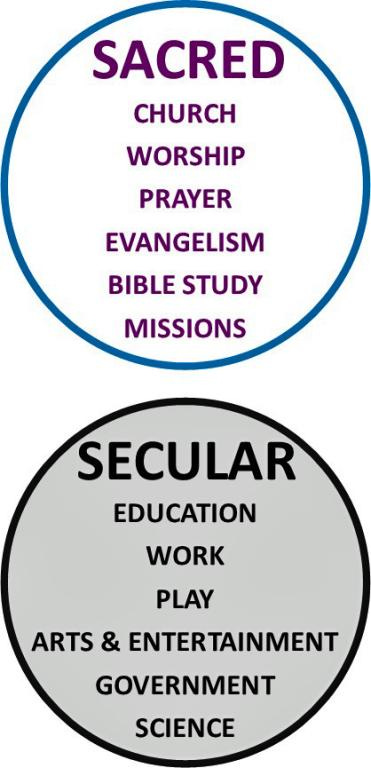There is an ongoing assumption in much of North American Christianity that salvation is focused only on the spiritual lives of humans and not on the whole of reality, including the material things that humans do physically in the world.
But God sees all things as spiritual; not as some things being sacred and other things being secular.
Os Guinness, in his excellent book The Call, writes that since God is sovereign, “everyone, everywhere, and in everything, should think, speak, live, and act entirely for him.”
To think otherwise is to fall prey to what he calls the “Catholic distortion,” “a form of dualism that elevates the spiritual at the expense of the secular.”
Martin Luther was the first to identify this distortion. He wrote,
“It is pure invention that pope, bishop, priests and monks are to be called the ‘spiritual estate’ while princes, lords, artisans, and farmers the ‘temporal estate.’ This is indeed a piece of deceit and hypocrisy. Yet no one need be intimidated by it, and for this reason: all Christians are truly of the ‘spiritual estate,’ and there is no difference among them except that of office.” (Three Treatises)
Protestants, however, have perpetuated this distortion with what Guinness calls “the fallacy of the contemporary Protestant term full-time Christian service—as if those not working for churches or Christian organizations are only part-time in the service of Christ.”
How would our mission be radically transformed if we rid ourselves of this conception that pastors and missionaries are the full-time ministers and all the rest of the congregation are there just to support their work?
False Sacred-Secular Dualism
According to Brian Walsh and J. Richard Middleton, the reason for this distortion of the biblical worldview can be summed up in one word: “dualism.”

“Dualism is a split-vision world-view. It separates reality into two fundamentally distinct categories: holy and profane, sacred and secular… In the place of a biblical understanding of the kingdom of God as God’s rule over all creation, the kingdom is identified with what has been called our spiritual life.” (The Transforming Vision: Shaping a Christian World View)
This split-vision view limits the “spiritual life” to things like prayer, Bible study, church attendance, evangelism, etc. Walsh and Middleton say that the notion of “full-time Christian service” that Guinness identified will continue to persist as long as this dualistic Christian worldview is propagated.
Not only that, they say that…
“Even when we reject this notion of full-time service and say that all Christians are full-time servants of the Lord, an unconscious dualism may still constrain us.
We often mean that we are all called to evangelize, no matter what situation we find ourselves in. In this case submission to Christ may still be limited to a so-called spiritual activity that is unrelated to the actual work of a secular occupation… Most of us are Christians and something else; we do not engage in our daily tasks integrally as Christians.”
Problems Stemming from False Dualism
In diagnosing the gap between Christian theology and our everyday lives, Robert Banks (in Redeeming the Routines: Bringing Theology to Life) provides a list of several problems that stem from this false dualism.
How have you seen these manifest themselves in your Christian community?
Few of us apply or know how to apply our belief to our work, or lack of work.
We only make minimal connections between our faith and our spare time activities.
We have little sense of a Christian approach to regular activities like domestic chores.
Our everyday concerns receive little attention in the church.
Only occasionally do professional theologians address routine activities.




Spot on and adding Banks to my never-ending reading list to hear more. I read a great book earlier this year that I suspect echos similar themes: "Liturgy of the Ordinary" by Tish Harrison Warren.